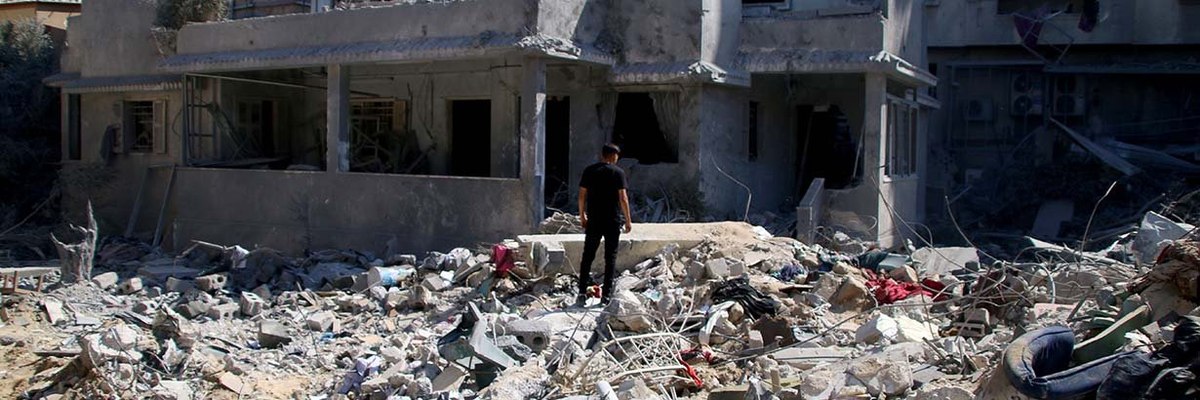12 months into the current conflict, YouGov looks at how sentiments have changed, whether either side is seen as being in the right, and what should happen now
Today marks one year since Hamas fighters launched a surprise attack on Israel, killing approximately 1,200 civilians and taking a further 250 hostages. In response, Israel launched retaliatory strikes on Gaza, followed by a ground invasion. The fighting is estimated to have killed more than 40,000 Palestinians to date, with the conflict having recently expanded into Lebanon.
This study draws on YouGov data from the past year, as well as a new survey for the Sunday Times, to explore where attitudes to the conflict stand 12 months on.
How have sentiments changed over the course of the Gaza conflict?
A YouGov survey in late September found 18% of Britons saying they sympathised more with the Israeli side, 28% with the Palestinian side, and 21% “both sides equally” – with a further 33% unsure.
In mid-2023, prior to the start of the current conflict, a YouGov survey found 10% of Britons were more on the Israeli side, while 23% backed the Palestinians more. One in five stood on the fence (19%), while 48% answered “don’t know”.
In the immediate aftermath of the 7 October attacks, greater sympathy for the Israeli side rose to 21%, a least at which it roughly maintained for the rest of the month, before declining slightly.
Meanwhile, the number more sympathetic with the Palestinian side declined eight points to 15% following the attacks, but steadily grew over the following months as the conflict wore on, reaching its current levels in February.
The more recent survey for the Sunday Times uses a slightly different question that shows the same levels of sympathy on the Israeli and Palestinian sides, but a different split between “don’t know” and “neither”. See bottom of article for wording experiment results.
While some Britons come down more clearly on one side of the debate than others, many have at least some sympathy for both sides. Most (56%) say they sympathise at least somewhat with the Palestinian side, and 48% say the same of the Israeli side.
This does, however, represent a decline in sympathy, for both sides – but more for the Israelis, for whom sympathy is down 16pts compared to 8pts for the Palestinians.
A quarter (26%) now have no sympathy for the Israelis, up from 12% in November, while 19% are unsympathetic to the Palestinians, up from 13%.
Looking at combined sympathies shows that the number of people who express sympathy for both sides in the conflict has fallen to 37%, from 56% last year.
Public opinion on the initial 7 October attacks, and Israel’s response
While many Britons have sympathy for the Palestinians, this does not translate into a belief that Hamas’s attacks on Israel on 7 October was justified. Just 5% of the public feel this way, including 12% of those who say their sympathies lie more on the Palestinian side.
Two thirds instead say that they think the 7 October attacks were unjustified (67%) – a figure which includes 71% of those who sympathise more with the Palestinians.
There is also a tendency to see Israel’s response in the 12 months since as being unjustified, with 47% saying so – although 24% do consider the ongoing operations by Israel to be justified. These figures are effectively unchanged since we last asked in March.
Digging more closely into this topic, we find that 38% of Britons believe that Israel was right to send troops into Gaza initially, but have gone too far and caused too many civilian casualties – the most common view expressed.
A further 14% think Israel was right to send troops into Gaza and that their actions have generally been proportionate. On the other hand, 13% say that Israel were wrong to use military force against Hamas at all.
One year after the start of the Gaza conflict, what do Britons think should happen now?
A major remaining sticking point for the Israeli government has been the hostages that Hamas took at the beginning of the conflict, with 97 reportedly still being kept as of the start of September.
Almost two thirds of Britons (64%) say that Hamas should immediately return the hostages, without waiting for a negotiated deal to end the conflict. Only 16% of Britons think they should only do this as part of a negotiated deal, with the rest unsure (19%).
On the other hand, only 40% of Britons say that Israel should withdraw its forces from the Gaza strip immediately, with 32% instead saying that they should only do this as part of a negotiated deal. A further 5% don’t think they should withdraw at all, with the remainder answering “don’t know” (23%).
Attitudes to Palestinian statehood and Israel’s right to exist
Over the course of the current conflict, several countries have decided to recognise Palestinian statehood, including Ireland, Norway and Spain.
YouGov research has shown that, even before the conflict, more people said the British government should recognise Palestine as an independent state than were opposed. A survey in June found that 47% of Britons said the government should recognise Palestinian statehood, up from 40% prior to the fighting – only 8% took the dissenting view.
A less technical version of this question on our Sunday Times survey shows that 70% of Britons think the Palestinians have a right to a state of their own, with the majority of people in every demographic and voting group in agreement. Just 6% of Britons deny that Palestinians have a right to a state of their own.
By the same token, about as many Britons also believe that Israel has a right to exist, at 66%, with only 8% disagreeing.
Public opinion on Israel’s recent attacks on Hezbollah
While the Lebanon-based Hezbollah militant group and Israel have been trading blows over the course of the Gaza conflict, and for years before, this fighting has increased significantly in recent weeks, with Israel now having launched an invasion into south Lebanon.
One of the first signs of a major escalation came on 17 September, when thousands of people in Lebanon were wounded by booby-trapped pagers exploding. Asked whether it is acceptable for Israel to have carried out attacks by “exploding bombs hidden inside pages used by Hezbollah”, only 20% think it is, compared to 54% who say it is not.
This is, in fact, seen as less acceptable than “using airstrikes to kill Hezbollah leaders” – which 31% see as acceptable and 37% unacceptable – or “sending ground troops into Lebanon to attack Hezbollah directly”, with 29% seeing this as ok compared to 39% who do not.
Wording experiment
YouGov has provided different answer options at various stages on the questions of sympathy in the Israel-Palestine conflict. The Sunday Times survey, as well as our automated website tracker, gives a ‘neither’ response choice, whereas our manual tracker (depicted above in the article) gives a ‘both sides equally’ option. As noted earlier, while sympathy for the Israeli and Palestinian sides remains unchanged whichever wording is used, the number of people choosing the third option or ‘don’t know’ can differ dramatically.
To test underlying sentiment, we ran an additional survey that included both the ‘neither’ and ‘both sides equally’ options. This gave 14% for ‘both’, 24% for ‘neither’ – between two thirds and three quarters of the figure either got in the questions where only one or the other was shown – and 18% for ‘don’t know’.
Given this don’t know figure closely matches that generated by the neither-only question format, this does suggest that those who answer ‘both equally’ when only that option is provided are more inclined to say ‘neither’ in its absence than vice versa. This suggests some of the ‘sympathise with both sides equally’ sentiment is not particularly strongly held, perhaps not surprising given the nature of the topic, with those having stronger views being more likely to have picked one side or the other in the conflict.
See the full results of the Sunday Times survey here, and the sympathy for Israel/Palestinian sides data here
What do you think about the Gaza conflict during the past year, the wider issue of Israel and Palestine, and everything else? Have your say, join the YouGov panel, and get paid to share your thoughts. Sign up here.
Photo: Getty








